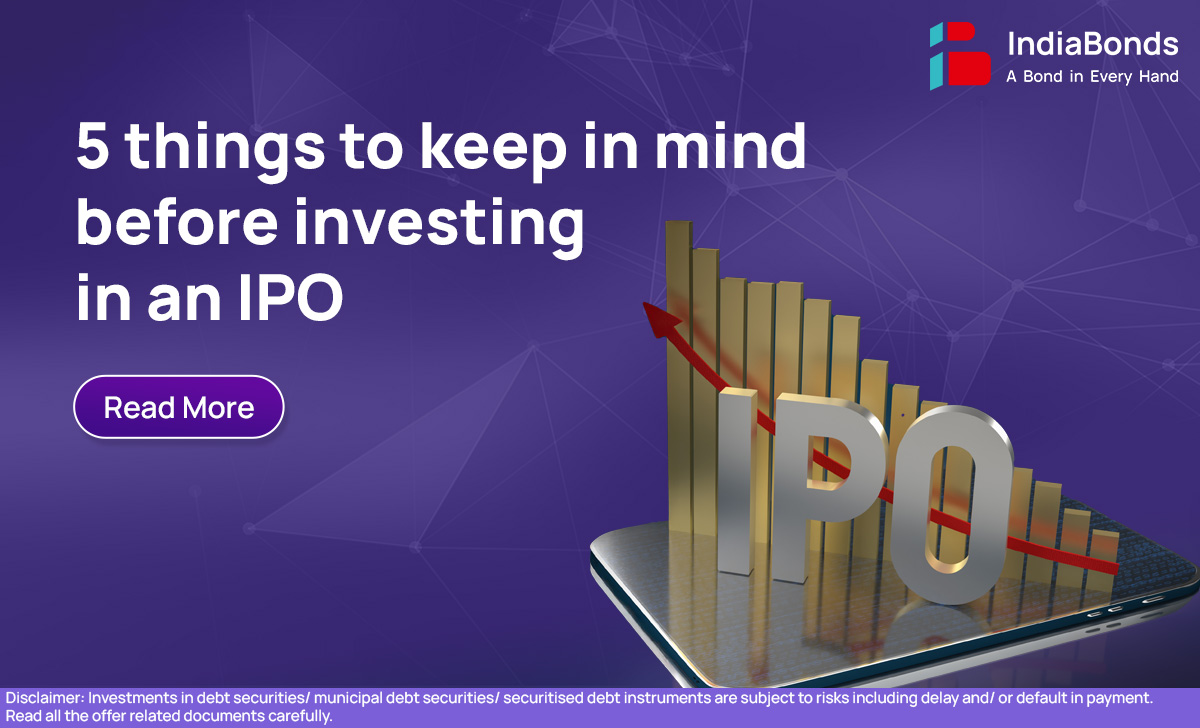5 things to keep in mind before investing in an IPO[

An IPO can feel like the golden ticket — a chance to get in early before a company’s shares hit the big stage. And while some IPO stocks have made headlines for stellar listing gains, not every new listing turns out to be a success story.
So before you jump into the next big IPO in the stock market, take a step back. Think of this as more than just a “get in early” moment. It’s an investment decision — and like every smart investment, it needs a little homework.
Here are 5 simple things to keep in mind before investing in an IPO, especially if you’re just starting your journey or exploring pre IPO investing.
1. Don’t Skip the Red Herring Prospectus
We get it — it’s a long, technical document. But this one’s worth a look. The Red Herring Prospectus (RHP) is where the company lays it all out — what they do, how they make money, what the risks are, and what they plan to do with your investment. If you’re serious about investing in an IPO, spend some time going through it (or at least the key sections). You’ll learn:
- How much revenue and profit the company is generating
- Where your money will go — expansion or debt repayment?
- Who’s leading the business
- What challenges the company is upfront about
It’s like reading the label before buying a product — basic, but essential.
2. Understand Why the Company is Going Public
Not all IPOs are built on strong growth stories. Some are just exit routes for early investors. And there’s nothing wrong with that — unless you’re buying into a company that’s no longer focused on growth.
So ask yourself:
Is this IPO about scaling up, or just cashing out?
If the funds raised are going into expansion or product development, that’s a good sign. But if most of it is going to existing shareholders or debt, hit pause and do a little more digging before you buy IPO shares.
3. Look at the Company’s Strengths — and Weaknesses
Don’t fall for the hype. Sure, an IPO might be trending, but is the company actually solving a real problem? Is it profitable? Growing steadily? What’s its track record?
Also, check the people behind the scenes — the promoters and leadership team. Have they built successful businesses before? Are they reliable?
When it comes to pre IPO investing, you often have limited data. That’s why checking the fundamentals matters even more. If a company is still burning cash with no clear plan for profitability, it might be a risk you don’t need to take right now.
4. Do a Quick Reality Check on Valuation
Sometimes IPOs are priced high — especially when markets are bullish. But high price doesn’t always mean high value.
Compare the company’s valuation with its peers. Is it asking for more, even though it earns less or grows slower? If yes, you might want to hold off.
Simple ratios like P/E (Price to Earnings) or P/B (Price to Book) can help you get a sense of whether the IPO is fairly priced. Remember, when you’re investing in an IPO, you’re entering at the ground level — but the price still has to make sense.
5. Compare It With Others in the Industry
This is where perspective comes in. Look at how the company stacks up against its competitors. Are others in the same space doing better? Is this company a leader or still finding its feet?
For example, if you’re looking at upcoming IPO stocks in the fintech space, compare their numbers, market share, and profitability. This helps you set realistic expectations and understand if this IPO is really worth your money.
Even if a company is new, it should have something unique — an edge that others don’t have.
FAQs
Q1. What are the factors to consider before investing in IPO?
Check the company’s fundamentals, read the RHP, understand why the IPO is being launched, compare the valuation, and see how the company performs against others in the same sector.
Q2. What to know before buying an IPO?
Know the business inside-out. Look at the company’s plans, how it uses the funds, promoter track record, and whether the IPO is attractively priced.
Q3. What are the 7 steps to getting an IPO?
- Open a Demat & Trading Account
- Check details of upcoming IPO stocks
- Read the RHP
- Decide how many shares to apply for
- Apply via ASBA or UPI
- Wait for allotment
- If allotted, shares are credited to your Demat
Q4. How to get luck in IPO?
Retail allotment is usually a lottery. To improve your chances, apply through different family Demat accounts and always apply for the minimum lot size.
Final Thoughts
Investing in an IPO can be exciting — it feels like you’re part of something big from day one. But don’t let the buzz cloud your judgement. Look beyond the headlines and evaluate whether the IPO really fits your investment goals.
And if you ever feel like you’re rushing into it, take a step back. IPOs will keep coming. But your money deserves patience, not pressure.
Think long-term. Think value. And let research lead the way.
Disclaimer : Investments in debt securities/ municipal debt securities/ securitised debt instruments are subject to risks including delay and/ or default in payment. Read all the offer related documents carefully.


















